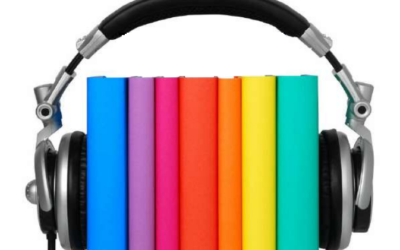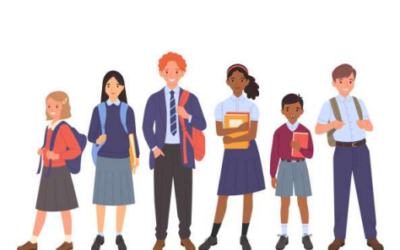Reading aloud can improve reading fluency, but for many students reading aloud at school causes stress and embarrassment. So what to do? SMALL GROUP or 1:1 READING At school, students may be able to get important practice in small groups or paired group reading or 1:1 with a teacher or teacher’s aide. There are also newly available free resources from Google Reading Tutor or Microsoft Reading Progress that record students reading, analyze speed and mistakes, and chart students’ progress over time. The picture above is an example of a report generated by Microsoft’s Reading Progress program. A formal software program is not needed for every day practice however; some students may be motivated by such a program, while others may not. For […]
The Pleasures of Reading by Ear
This multi-colored brain image shows what brains do when they're listening to stories. Learn more about this HERE. It's a whole brain workout and its effects seem largely the same whether you listen to a book or read it with your eyes (research HERE). Stories go right...
Dyslexia and Accelerated Reader [Premium]
Accelerated Reader (AR) is a popular computer-based reading program. It does not remediate students with dyslexia. It just offers books at different levels and nudges students to an “appropriate level of challenge,” in addition to offering comprehension tests to check understanding and quantitative information for parents and teachers in the process. The promises of AR are attractive and at least some studies show improved reading of groups of students (some studies show no increase and decreased motivation). Because some classes celebrate high AR point scorers, it should not be surprising that lower scorers are less happy, have lower esteem, and become dis-incentivized to read for pleasure. AR goals are individualized and the AR company does not encourage open competition or achievement-related rewards, but all these […]
The Strange Case of Reading Small Words [Premium]
A parent may notice it first in a beginning reader or an adult who finds it exasperating when trying read aloud – why is it that the “small words” are so easy to skip or misread? It is a sign of dyslexia? The skipping or misreading of small words can be associated with dyslexia, but can also be unrelated. ONE POSSIBILITY VISUAL TRACKING AND “READING TOO FAST” Developmental optometrists have frequently identified visual tracking abnormalities and convergence insufficiency in school age dyslexic children. This does not mean that visual issues cause dyslexia – they just suggest that they may commonly be found in this group of child and therefore contribute to word or line skips. Students who feel pressured to read fast may […]
The Many Faces of Actor Paul Bettany
I finally had a chance to catch up on Avengers: Infinity War so I could write an article on amazing Paul Bettany. Paul plays so many different characters so well that I often don't realize that he was the same actor in so many different roles. After long being heard...
Dyslexia: Beyond Decoding
If dyslexic students are struggling to decode words, a program of intensive structured literacy will help - but help with phonological awareness may not be sufficient to help them become fluent readers. Why? Because reading fluency, or the ability to read with...
Dyslexia Advocacy: Say Dyslexia 2.0
From Chalkbeat's story, "NYC plans to screen nearly 200,000 students in the early grades to uncover struggling readers. Then what?" "In a massive bid to gauge reading skills following COVID-related learning disruptions, New York City’s education department is...
Reading Fluency for College [Premium]
Recently we were contacted by a student who wanted to improve his reading fluency before attending college. He had completed a full course of “Wilson and Orton-Gillingham” yet his reading was still slow and effortful. He asked, “Is there anything I can do to improve my reading to help me be successful in college?” ANSWER: First of all, good for you for looking ahead and preparing yourself for college. It is possible to get through college with slow effortful reading, but probably only if you’re competent with assistive technology and can listen to all of your books instead of reading them traditionally. Although most colleges and universities are required to make “reasonable accommodations,” schools and individual faculty members can vary, and practical issues – […]
Dr Roxanne Varzi: Creative Anthropologist
I recently had the chance to talk to Dr Roxanne Varzi, a writer, anthropologist, and filmmaker who was also the first Fulbright Awardee since the Islamic Revolution for research in Iran. She's doing such interesting work that is creative on many levels that I...
White Noise Improves Reading Skills and Memory in Reading Disabilities [Premium]
Some of you may remember research in the past that showed that individuals with dyslexia have more difficulty screening out background noise (discussed in the news HERE). Students or adults with this difficulty can usually request quiet area for work or test-taking under the ADA or Americans for Disabilities Act. Now another research group has tested the effect of “white noise” on reading skills and memory recall in children with a reading disability. From the paper: “The study was conducted with a group of 30 children with RD and phonological decoding difficulties and two comparison groups: one consisting of skilled readers (n = 22) and another of children with mild orthographic reading problems and age adequate phonological decoding (n = 30). White noise […]
Daydreaming While Reading [Premium]
“There are certain half-dreaming moods of mind in which we naturally steal away from noise and glare, and seek some quiet haunt where we may indulge our reveries and build our air castles undisturbed.” – Washington Irving Daydreaming holds a curious position in the areas of science. On the one hand, daydreaming has been seen as a negative, associated with inattention and poor task persistence, but on the other, associated with creative behavior and personal inspiration. Neuroscientists have taken a renewed interest in daydreaming because daydream pathways activate the default mode network, a brain network that is now known to be important for reflecting on one’s self as well as others, remembering the past, and imagining the future. Studies of dyslexic and non-dyslexic people […]
Preparing with Templates and Posters [Premium]
When interviewing accomplished people of all sorts who are also dyslexic, there are some recurring themes – and one is, “I learned how to do the ‘dyslexic thing,’ you know, overprepare.” In some cases that means committing more hours to something – whether it was oral presentation or final project or job rotation. But often, it’s not just extra time spent; it’s also learning how to streamline certain repetitive features along the lines of “plan better” and not just “work more.” I was recently reminded of this when a social worker posted her work hacks for school and for work. One example is creating a template for her case notes: The template streamlines repetitive information that needs to be covered and reduces […]

![Helping Kids to Practice Reading Aloud [Premium]](https://www.dyslexicadvantage.org/wp-content/uploads/2022/01/Helping-Kids-to-Practice-Reading-Out-loud-1-400x250.jpg)

![Dyslexia and Accelerated Reader [Premium]](https://www.dyslexicadvantage.org/wp-content/uploads/2021/11/Accelerated-Reader-400x250.jpg)
![The Strange Case of Reading Small Words [Premium]](https://www.dyslexicadvantage.org/wp-content/uploads/2021/11/Strange-Case-2-400x250.jpg)



![Reading Fluency for College [Premium]](https://www.dyslexicadvantage.org/wp-content/uploads/2021/10/Reading-Fluency-2-400x250.jpg)

![White Noise Improves Reading Skills and Memory in Reading Disabilities [Premium]](https://www.dyslexicadvantage.org/wp-content/uploads/2021/09/White-noise-2-400x250.jpg)
![Daydreaming While Reading [Premium]](https://www.dyslexicadvantage.org/wp-content/uploads/2021/08/daydream-400x250.jpg)
![Preparing with Templates and Posters [Premium]](https://www.dyslexicadvantage.org/wp-content/uploads/2021/08/Templates-2-400x250.jpg)













